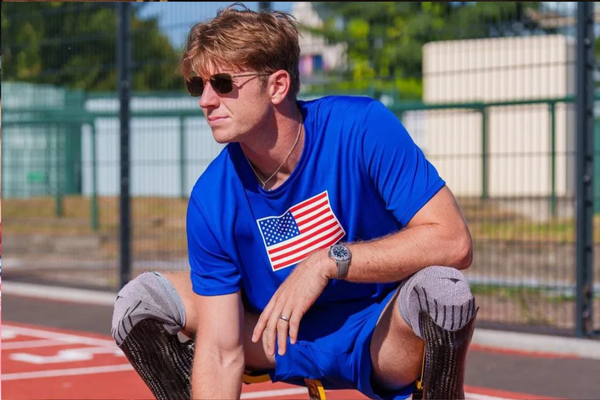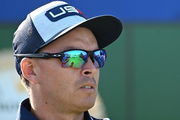
Imago
Image via IMAGO

Imago
Image via IMAGO
“The only disability in life is a negative attitude”— Tatyana McFadden, a 20-time Paralympic medalist, had once said. This quote fits best for Hunter Woodhall, who wasn’t even a year old when he had to get his legs amputated. And today, he proudly holds the title of a Paralympian. But in a true champion spirit, he decided not to limit the scope of this title to himself. Woodhall wishes to create an inclusive place where everyone has a chance to chase their athletic dream, without limitations. And he has a plan for it! One would assume that all would be on board with an idea that boasts inclusivity. Sadly, that is not the case here.
Watch What’s Trending Now!
This week, Hunter took to his Threads feed to announce that he will be working on his dream project. Stating “We’re working on a prosthetic office to make running/sports prosthetics for everyone!” he made the call for action. But something about that post did not sit right with the general audience, and now Hunter Woodhall had to chime in to clarify yet again. How so?
Well, taking to Threads once again on May 22, 2025, he made a second post, offering clarifications on his words. He wrote, “In my last post, I said ‘running is a privilege not a right’, a few people corrected me to say ‘running is a right not a privilege’.” When Hunter announced the prosthetic office, he used a line that sparked a debate among many. While informing us that he has a bill passed in Arkansas that forces insurance to cover secondary prosthetics, he said, “Running is a privilege not a right!“
ADVERTISEMENT
Now, a comment section where the top comment is expected to be celebratory, but this does not happen. “Don’t you mean running is a right and not a privilege?” And this was one of many that continue to pen opinions, as we write. The back and forth continued further from here. Explaining what he meant, he wrote, “After thinking about it I wrote what I meant. Running is a privilege, not everyone has a healthy body to run. Not everyone has access to prosthetics or options to run. If you have the ability to run it’s a privilege. We’re making an office to make running legs so we can extend the privilege to as many people as possible.”
The office that he talks of here is the one that aims to make sports prosthetics accessible to more people. He’s setting up a prosthetic office dedicated to creating running blades and other athletic prosthetics for those who need them. The idea is to reach the people who can’t afford or access proper gear and have a real chance at chasing their dreams.
Talking of an athlete with no access to prosthetics, South Africa’s Ntando Mahlangu is a prominent example. And these are kinds of stories that Woodhall is aiming to amplify with his venture. The man who got the Gold medal in the Tokyo 2020 Paralympics – T63 200m & Long Jump. Until the age of 10, he had no prosthetics and couldn’t run or walk like other children. In 2012, after a life-changing surgery to amputate both legs at the knee, he was finally fitted with running blades through the Jumping Kids prosthetics foundation in South Africa.
ADVERTISEMENT

ADVERTISEMENT
But having prosthetics is not as easy as you might think; even Hunter Woodhall has faced significant challenges with the blades he has in his legs.
Top Stories
Scottie Scheffler Faces Scrutiny After Taking Out Anger on Golf Club at WM Phoenix Open: ‘Washed’

Jordan Spieth Throws Bizarre Temper Tantrum as Opening Round at WM Phoenix Open Becomes a Challenge

Rob Gronkowski Demands Severe Punishment for Andy Reid After Bill Belichick Snub

PGA Tour Split Into Two as Scottie Scheffler Confirms Stance on Patrick Reed’s Return

Drake Maye Reveals Shoulder Injury Update as Patriots QB Announces News On Super Bowl Availability

Rickie Fowler Fans Demand Answers Following ESPN’s Controversial WM Phoenix Open Decision

ADVERTISEMENT
Hunter Woodhall’s personal struggles with prosthetics
Turning the clock, in the lead-up to the 2023 World Para Athletics Championships, Woodhall discovered his prosthetic legs made him stand just a centimeter too tall under race regulations. To comply, his team drilled new holes into the blades, shortening them—but at a cost. The structural compromise led to disaster: at the start of his signature 400m T62 race in Paris, one of the prosthetics detached mid-launch, forcing him to pull out of a world-stage event he had trained tirelessly for.
Hunter Woodhall does not like beaches. Any guesses why? Because it’s coarse and rough and irritating, and it gets everywhere. In late 2024, during a long jump practice with his wife, Olympic gold medalist Tara Davis-Woodhall, Hunter’s blades were clogged with sand. “I just did standing long jump into the sandpit and it was after three jumps,” Hunter explained as she poured the sand out of the prosthetics. He opened the feet – sand. He took out the socks sand.
In 2025, he shared a video of himself practicing the block starts coupled with resistance training. But his blades did not give back, he said, “Pushing good I’m not going nowhere. These blades are just not giving nothing back. Not so much of an advantage now. Fighting against two machines now.” So, even prosthetics do not make it much easier for a Paralympian, but a prosthetic office is a great idea, don’t you think?
ADVERTISEMENT
ADVERTISEMENT
ADVERTISEMENT
ADVERTISEMENT